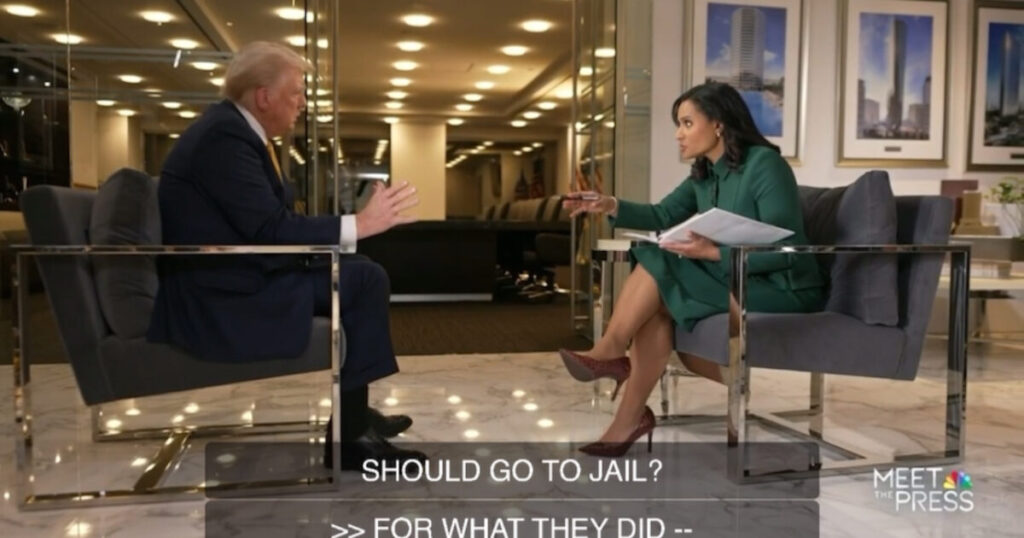In a recent interview with NBC, former President Donald Trump expressed his belief that members of the Congressional January 6 Committee should be held accountable for their actions, suggesting they “should go to jail.” During this combative exchange with reporter Kirsten Welker, Trump defended his claims regarding the legitimacy of the 2020 election and criticized the motives and actions of the January 6 Committee. He reiterated his intentions, should he reclaim the presidency in 2024, including pardoning individuals charged in connection with the January 6 Capitol protest, a move he characterized as a necessary act of justice for those he believes have been wrongfully accused.
Amid these discussions, the narrative surrounding potential pardons has shifted in light of a changing political landscape. Reports indicate that President Joe Biden is contemplating issuing preemptive pardons for members of Congress who allegedly participated in election interference. This comes as many Democrats are beginning to distance themselves from targeting political opponents with prosecution, especially now that the Democrats have lost their majority power in Congress. Such initiatives have sparked a debate surrounding fairness and partisanship in judicial proceedings, raising critical questions about the implications of these actions for future political discourse.
The Gateway Pundit has alleged that evidence related to the January 6 Committee was mishandled, specifically pointing to the deletion of a significant number of documents in early January 2023, just as the Republicans were set to take control of the House. Claims have been made that 117 encrypted files containing pertinent information were deleted, highlighting what some see as a deliberate cover-up by the committee. Trump and his supporters argue this destruction of evidence is not only a crime but also a clear indication of the committee’s bias against him. They contend that, through this purportedly illegal act, the committee sought to protect its narrative at the expense of the truth.
Among other controversies surrounding the January 6 narrative are condemnation and dismissals regarding testimonies provided by witnesses like Cassidy Hutchinson. Hutchinson’s assertions that Trump attempted to commandeer his motorcade have been categorically denied by other key witnesses, including the driver of the vehicle involved. This contradiction has significantly undermined confidence in the committee’s findings. Furthermore, critical testimony that might exonerate Trump has reportedly been erased or ignored, provoking allegations of a cover-up designed to implicate him in the events of January 6.
During his interview, Trump went beyond simply naming names, emphasizing the consequences he believes the committee members should face for their actions. He indicated that individuals like Liz Cheney and Bennie Thompson, prominent figures in the committee, acted with ulterior motives that warrant serious repercussions. Welker pressed Trump on whether he would take direct action against these individuals if he were to return to office, to which he clarified that while he expects accountability, he would not use the FBI to target them, instead focusing on broader policy objectives.
As discussions around presidential pardons proliferate, the political climate continues to evolve. Democrats and some Republicans are contemplating the implications of potential pardons, not just as acts of forgiveness but as political maneuvers to shield themselves from potential retribution in a hypothetical future Trump administration. This has ignited further discourse on the ethics of political pardons, especially in light of Biden’s extensive pardon of his son Hunter, complicating perceptions of justice and accountability in the current political era. Acknowledging the tensions surrounding the January 6 incident and its aftermath, the next presidential term holds significant potential for continuing conflict between party lines, particularly as figures like Trump continue to assert their narratives in the media.

